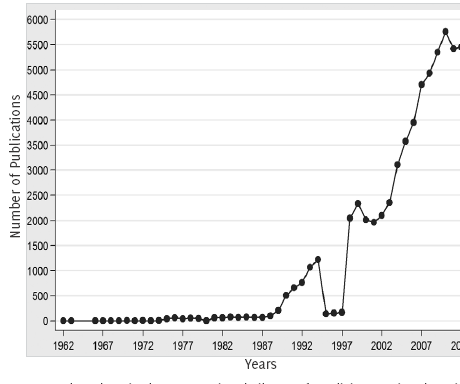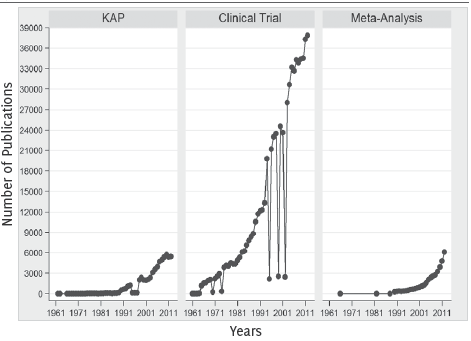Letter to the Editor
Recommendations for Future Articles on Knowledge, Attitudes and Practices in IJMS
Yenny Torres-Vallejo123, Carlos A. Ruiz-Galeano123, Francisco J. Bonilla-Escobar24
doi: http://dx.doi.org/10.5195/ijms.2013.227
Volume 1, Number 3: 135-136
To the Editor,
The International Journal of Medical Students (IJMS) was created with the objective
of sharing the scientific production and experiences of medical students and recently
graduated physicians worldwide. As a scientific dissemination platform, it requires
the material published to be of the highest quality.1
It is striking that the first two issues of the first volume of the journal each had
an article with Knowledge, Attitude and Practices (KAP) in health methodology. This
fact motivated the authors to write this letter to discuss some methodological issues
about KAP studies, to present the evolution of this method as a scientific publication,
and to discuss the main limitations of KAP studies recently published in IJMS.
KAP studies are based on a quantitative method that collects both quantitative and
qualitative information. These type of articles can reveal characteristics of the
knowledge, attitudes and behaviors of health factors relating them to religious, social
and traditional factors and can expose some of the personal ideas that each individual
has about a given condition.2
Furthermore, these types of studies provide a relatively simple study methodology
ideal for medical students, in their initial phases of research training, to approach
a problem from both a quantitative and qualitative perspective. This methodology offers
an initial, wide perspective about a problem, uncovering opportunities for medical
students for further research studies that can result in a positive impact on their
community, while at the same time aiding in the development of skills as investigators
in training.3,4
KAP studies have been evolving and their use has demonstrated an average increase
of 105 published articles per year (R2=68%, p <0.00001) in the period between 1961 and 2012 (Figure 1); however, if the analysis is restricted to encompass articles published from 1990
to 2012, publications have increased by 278 articles per year (R2=88.9%, p <0.0001).
Figure 1.
Number of Publications with Knowledge, Attitude and Practice methodology Published
in PubMed® from 1962-2012

Source: PubMed, United States National Library of Medicine, National Institutes of Health.
(Available from: http://www.ncbi.nlm.nih.gov/pubmed/, cited 2013 Sept 16) Using the keyword: “Health Knowledge, Attitudes, Practice” and
timeline download option (Download Comma Separated Values, CSV).
The growth of KAP articles when compared to Meta-Analysis has shown that they are
less frequently used, albeit this difference is non-significant, with a median number
of publications in all its history up to 2012 of 99 vs. 795 publications, respectively
(Mann-Whitney test, p=0.08, KAP percentile 25 [p25]=41 and percentile 75 [p75]=2,048,
and Meta-Analysis p25=371 and p75=2,332 publications). In contrast, KAP articles have
a longer history, having their first publication in 1962, close to the year when the
first Clinical Trial was published in 1961 and a few years before the first Meta-analysis
was published in 1966 (Figure 2).
Figure 2.
Number of Publications with Knowledge, Attitude and Practice methodology, Clinical
Trials and Meta-Analysis Published in PubMed® from 1961-2012

Abbreviations: KAP, Knowledge, Attitude and Practice methodology studies. Source: PubMed, United
States National Library of Medicine, National Institutes of Health. (Available from:
http://www.ncbi.nlm.nih.gov/pubmed/, cited 2013 Sept 16) Using the keywords: “Meta-Analysis [Publication Type]”, and
“Clinical Trial [Publication Type]” and timeline download option (Download Comma Separated
Values, CSV).
To properly design a KAP study, there are four recommendations that should be followed:
(1) Development of a survey protocol, which should contain identification of the target
population, calculation of sample size, sampling methods, questionnaire, adaptation
of the answers, analysis plan, pretest questionnaire, construction of the data entry
form, validation of questionnaire and validation of survey protocol; (2) Preparation
of the survey, which should be adapted to the target population and should describe
the schedule, materials, human resources and logistical needs and a pilot test of
the survey; (3) Implementation of the survey including approval and consents, checking
questionnaires, general supervision of the survey; and (4) Data analysis and preparation
for publication.5
Sometimes authors overlook some of the above-mentioned 4 steps in developing a KAP
study, or underestimate the importance of the research protocol and the criteria to
select a research method and its systematic development while it is written.4 Therefore if the purpose is to show relevant results from the public health perspective,
it is imperative that investigators follow closely the described recommendations.
The IJMS has published two KAP articles in its first volume, the first one by Bonilla-Escobar
FJ, with the title “Red Eye: Next Steps for Conducting Research in Knowledge, Attitude
and Practice in Ophthalmology” in issue 1, and the second by Eissa AT, with the title
“Knowledge, Attitudes and Practices towards Medication use among Health Care Students
in King Saud University” in issue 2.6,7 By following the described recommendations, the authors would like to point out some
weaknesses found in these studies:
- Failure to show the calculation of the sample size and selection of the study population:
This will tell the reader if the information presented is statistically relevant for
a given delta, power and effect size and if the assumptions can be considered true
for the study population (internal validity).8
- Failure to describe the sampling methods: This information is necessary to understand
the generalizability of the study findings (external validity) and comprehend the
analysis used.4
- Failure to state the objective, conclusions and recommendations of the study: These
should be clearly stated, due to the impact that those studies can have in public
health and thus will facilitate the application of the results in their communities.3
- Failure to report the survey questionnaire used to collect the data: As this information
will be useful for other researchers who may want to replicate the study in other
conditions.
- Failure to describe if a pretest survey was performed: A pre-test survey helps to
identify if the instrument is measuring the construct (idea) that the researcher wants
to measure, to recognize problems with the instrument and to adjust the questions
to the population.9
KAP studies offer a good opportunity for medical students to conduct their first research
studies; however, it is important to take into account the specific methodological
requirements for these types of studies. Guidelines in qualitative and quantitative
methods are needed to improve the systematic design and reporting of KAP studies and
facilitate the application of their findings to public health.
Acknowledgments:
None
Conflict of Interest Statement & Funding:
The Authors have no funding, financial relationships or conflicts of interest to disclose.
1. Bonilla-Velez J, Peña-Oscuvilca A, Sahin I, Córdoba-Grueso WS, Fernandez-Zapico ME. The International Journal of Medical Students, a Platform for Medical Student Research
Worldwide. Int J Med Students. 2013;1(1):6–7.
2. Lambert H, McKevitt C. Anthropology in health research: from qualitative methods to multidisciplinarity. BMJ. 2002;325(7357):210–3.
3. Straus SE, Tetroe JM, Graham ID. Knowledge translation is the use of knowledge in health care decision making. J Clin Epidemiol. 2011;64(1):6–10.
4. Launiala A. How much can a KAP survey tell us about people’s knowledge, attitudes and practices?
Some observations from medical anthropology research on malaria in pregnancy in Malawi. Anthropology Matters Journal. 2009;1(1):1–13.
5. World Health Organization, Stop TB Partnership. Advocacy, communication and social mobilization for TB control: a guide to developing
knowledge, attitude and practice surveys. Geneva: World Health Organization; 2008.
6. Bonilla-Escobar FJ, Ocampo-Dominguez HH. Red Eye: Next Steps for Conducting Research in Knowledge, Attitude and Practice in
Ophthalmology. Int J Med Students. 2013;1(1):24–7.
7. Eissa AT. Knowledge, attitudes and practices towards medication use among health care students
in King Saud University. Int J Med Students. 2013;1(2):66–9.
8. Higgins JP, Altman DG, Gotzsche PC, Juni P, Moher D, Oxman AD, et al. The Cochrane Collaboration’s tool for assessing risk of bias in randomised trials. BMJ. 2011;343:d5928.
9. Martínez-Arias MR, Hernández-Lloreda MV, Hernández-Lloreda MJ. Psicometría / Psychometry. Madrid: Alianza Editorial, S.A.; 2006.
Yenny Torres-Vallejo, 1 Scientific Association of Medical Students of the University of Antioquia – ASCEM U de A, Medellín, Colombia.
2 Colombian Medical Student Association of Scientific Societies – ASCEMCOL,
Colombia.
3 School of Medicine, University of Antioquia, Medellín, Colombia.
Carlos A. Ruiz-Galeano, 1 Scientific Association of Medical Students of the University of Antioquia – ASCEM U de A, Medellín, Colombia.
2 Colombian Medical Student Association of Scientific Societies – ASCEMCOL,
Colombia.
3 School of Medicine, University of Antioquia, Medellín, Colombia.
Francisco J. Bonilla-Escobar,
, 2 Colombian Medical Student Association of Scientific Societies – ASCEMCOL,
Colombia.
4 Cisalva Institute, School of Public Health,
University of Valle, Cali, Colombia.
About the Author: Yenny Torres Vallejo is currently a 5th year medical student of a seven-year program
at the University of Antioquia, Medellín, Colombia. She is the Vice-President of Internal
Affairs of the Colombian Medical Student Association of Scientific Societies.
fjbonillaescobar@gmail.com
Cite as: Torres-Vallejo Y, Ruiz-Galeano CA, Bonilla-Escobar FJ. Recommendations for Future Articles on Knowledge, Attitudes and Practices on IJMS. Int J Med Students. 2013;1(3):135-6.
Copyright © 2013 Yenny Torres-Vallejo, Carlos A. Ruiz-Galeano, Francisco J. Bonilla-Escobar
International Journal of Medical Students, VOLUME 1, NUMBER 3, December 2013

